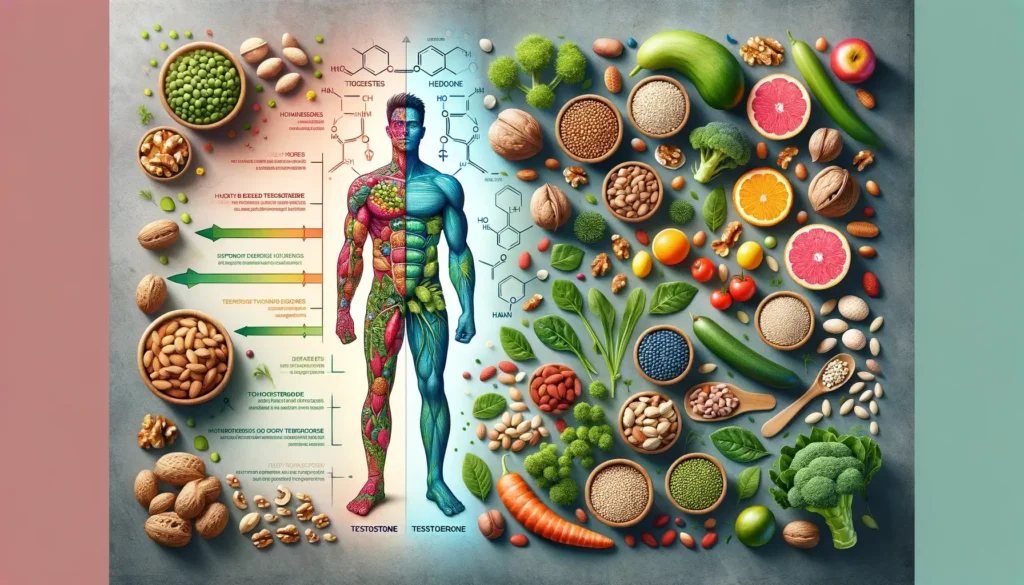Testosterone is an essential hormone that plays a crucial role in various aspects of our health, including fertility, muscle mass, bone density, and mood. However, testosterone levels can naturally decrease with age and can be influenced by factors such as medications, health conditions, alcohol abuse, and stress.
Research suggests that diet can also impact testosterone levels. Certain foods and nutrients have been linked to either increasing or decreasing testosterone production. Understanding the role of diet in testosterone levels can help individuals make informed choices to support hormone balance and overall well-being.
Key Takeaways:
- Testosterone is a vital hormone for various bodily functions.
- Diet plays a significant role in testosterone levels.
- Some diets, such as the keto and carnivore diets, may potentially increase testosterone levels, but their long-term effects are still unclear.
- A plant-based diet does not appear to have a significant impact on testosterone levels.
- Certain nutrients found in food and supplements, such as selenium, zinc, and fenugreek, may help increase testosterone levels.
Total Testosterone vs. Free Testosterone
Understanding the difference between total testosterone and free testosterone is crucial when assessing testosterone levels and their impact on overall health. While both types of testosterone play important roles in the body, their functions and availability differ.
Total Testosterone:
Total testosterone refers to the overall amount of testosterone present in the body, including both bound and unbound forms. The majority of testosterone in the bloodstream is tightly bound to sex hormone-binding globulin (SHBG) and albumin, rendering it inactive and unavailable for immediate use.
Free Testosterone:
On the other hand, free testosterone represents the unbound and bioavailable form of testosterone that is not bound to proteins. This unbound testosterone, which accounts for around 2% of total testosterone, is readily available for use by the body’s tissues and cells.
Low levels of free testosterone have been associated with various health conditions, including erectile dysfunction and testosterone deficiency. However, further research is needed to fully understand the health impacts of total, free, and bioavailable testosterone levels.
- Total testosterone refers to the overall amount of testosterone in the body, including both bound and unbound forms.
- Free testosterone represents the unbound and bioavailable form of testosterone that is readily available for use by the body.
- Low levels of free testosterone may be associated with conditions like erectile dysfunction.
- Further research is needed to fully understand the health impacts of total, free, and bioavailable testosterone levels.
How Diet Affects Testosterone
Diet has a significant impact on testosterone levels. The foods we consume can either promote or hinder testosterone production in our bodies. Understanding how diet affects testosterone is essential for maintaining optimal hormone levels and overall health.
The Pro-Inflammatory Diet and Testosterone Levels
A pro-inflammatory diet, characterized by high consumption of refined carbohydrates and saturated fats, has been linked to lower testosterone levels. This type of diet can trigger chronic inflammation in the body, which negatively affects testosterone production.
Inflammation disrupts hormone signaling pathways, leading to decreased testosterone synthesis and release. Additionally, the pro-inflammatory diet is associated with weight gain and an increased risk of obesity, both of which further lower testosterone levels.
The Keto and Carnivore Diets and Testosterone
The keto diet, a low-carb, high-fat diet, has gained popularity for its potential to increase testosterone levels. By eliminating or severely restricting carbohydrates, the keto diet promotes a metabolic state called ketosis, which may enhance testosterone production.
The carnivore diet, which focuses exclusively on animal-based foods and excludes plant-based foods, also shows promise in positively influencing testosterone levels. Animal fats and proteins provide essential nutrients like cholesterol, which is a precursor for testosterone synthesis.
However, it is important to consider the potential long-term health effects of these diets. More research is needed to fully understand the implications of sustained ketosis and the exclusion of plant-based foods on testosterone levels and overall health.

The Plant-Based Diet and Testosterone
In contrast to the pro-inflammatory diet, a plant-based diet has no significant effect on testosterone levels. Plant-based diets are rich in fiber, vitamins, minerals, and antioxidants, which promote overall health and well-being.
While a plant-based diet may not directly impact testosterone levels, it offers numerous benefits for hormone balance and overall health. This diet is associated with lower risks of chronic diseases, including heart disease, type 2 diabetes, and certain types of cancer.
Additionally, plant-based diets support healthy weight management, which is crucial for maintaining normal testosterone levels. By ensuring a balanced intake of nutrients and promoting weight control, a plant-based diet indirectly supports testosterone production and overall hormone balance.
| Diet | Effect on Testosterone Levels |
|---|---|
| Pro-Inflammatory Diet | Decreases testosterone levels Increases inflammation and obesity risk |
| Keto Diet | May increase testosterone levels Promotes metabolic state for testosterone production |
| Carnivore Diet | May increase testosterone levels Provides essential nutrients for synthesis |
| Plant-Based Diet | No significant effect on testosterone levels Supports overall health and hormone balance |
The Impact of Specific Diets on Testosterone Levels
When it comes to testosterone levels, different diets can have varying effects. Let’s explore the impact of specific diets on testosterone levels: the keto diet, the carnivore diet, and the plant-based diet.
The Keto Diet and Testosterone Levels
Research suggests that the keto diet may increase testosterone levels, possibly due to the increased intake of cholesterol. Cholesterol is a building block for testosterone production, and the high-fat content of the keto diet provides ample cholesterol.
However, it’s important to note that the long-term health effects of the keto diet on testosterone levels are still unclear.
The Carnivore Diet and Testosterone Levels
The impact of the carnivore diet on testosterone levels is currently uncertain. While this diet eliminates plant-based foods and focuses on animal products, which contain essential nutrients for testosterone production, further research is needed to fully understand its effects.
It’s worth mentioning that diets high in processed red meat, which could be part of a carnivore diet, may have negative effects on fertility due to their potential impact on sperm quality.
The Plant-Based Diet and Testosterone Levels
A plant-based diet has been associated with improved sperm quality and overall health benefits. While it may not have a significant impact on testosterone levels, a plant-based diet supports hormone balance and offers a range of nutrients essential for overall well-being.
The sufficient intake of vitamins, minerals, and antioxidants in a plant-based diet can positively contribute to hormonal health.
It’s important to note that more research is needed to understand the long-term effects of these diets on both fertility and overall health. Before making any significant changes to your diet, it’s advisable to consult with a healthcare professional or a registered dietitian.
| Diet | Effect on Testosterone Levels | Long-Term Health Effects |
|---|---|---|
| Keto Diet | May increase testosterone levels* | Unclear, further research needed |
| Carnivore Diet | Effects on testosterone levels uncertain* | Unclear, further research needed |
| Plant-Based Diet | No significant impact on testosterone levels* | Improved sperm quality and overall health benefits |
*Please note that testosterone levels can be influenced by various factors, and individual responses to different diets may vary.

Remember, maintaining a balanced and nutritious diet is crucial for supporting healthy testosterone levels.
While these diets may have potential effects on testosterone, it’s essential to prioritize overall well-being and consider other factors, such as exercise, stress management, and adequate sleep, to support optimal hormone balance.
As always, it’s best to consult with a healthcare professional for personalized advice.
Conclusion
In conclusion, the role of diet in testosterone levels cannot be underestimated. A pro-inflammatory diet high in refined carbohydrates and saturated fats has been shown to lower testosterone levels, which can impact fertility, muscle mass, and overall well-being.
On the other hand, the keto and carnivore diets may increase testosterone levels, but their long-term effects on health are still uncertain.
For those who prefer a plant-based diet, it’s good news that it appears to have no significant effect on testosterone levels. In fact, a plant-based diet offers various other health benefits and is associated with improved sperm quality.
However, it is also important to note that more research is needed to fully understand the impact of different diets on fertility and overall health.
To support healthy testosterone levels, it is advisable to include specific nutrients in your diet or as supplements. Selenium, zinc, and fenugreek are believed to help increase testosterone production. Maintaining a balanced and nutritious diet is crucial, regardless of the specific eating plan you choose.
Overall, diet plays a crucial role in testosterone levels, and making informed dietary choices can have a significant impact on hormone balance and overall well-being.
By understanding the effects of different diets and incorporating testosterone-boosting foods and nutrients, you can take steps towards optimizing your testosterone levels naturally.
FAQ
What is the role of diet in testosterone levels?
Diet plays a significant role in testosterone levels. Certain diets can lower testosterone levels, while others may increase them. The type and quality of nutrients consumed can impact hormone balance and testosterone production.
What are the different types of testosterone?
There are different types of testosterone, including total testosterone, free testosterone, and bioavailable testosterone. Total testosterone refers to the total amount of testosterone in the body, while free testosterone is the unbound form that is available for use by the body.
Bioavailable testosterone refers to the testosterone that is not bound to proteins and is also available for use.
How does diet affect testosterone?
A pro-inflammatory diet high in refined carbohydrates and saturated fats has been linked to lower testosterone levels. This type of diet can also lead to weight gain and increased risk of obesity, which further lowers testosterone levels.
On the other hand, the keto and carnivore diets may increase testosterone levels, while a plant-based diet has no significant effect on testosterone levels.
Can the keto diet increase testosterone levels?
Research suggests that the keto diet may increase testosterone levels. This may be due to the increased intake of cholesterol, which is important for testosterone production. However, the long-term health effects of the keto diet on testosterone levels are still unclear.
Does the carnivore diet affect testosterone levels?
The impact of the carnivore diet on testosterone levels is still unclear. While eliminating plant-based foods, which may contain phytoestrogens that can affect hormone balance, the long-term health effects of the carnivore diet on testosterone levels are not yet fully understood.
What effect does a plant-based diet have on testosterone levels?
A plant-based diet has no significant effect on testosterone levels. In fact, it has been associated with improved sperm quality and overall health benefits. However, more research is needed to understand the long-term effects of a plant-based diet on fertility and overall health.
Can certain nutrients increase testosterone levels?
Certain nutrients found in food and supplements, such as selenium, zinc, and fenugreek, may help increase testosterone levels. Including these nutrients in your diet or as supplements can support healthy testosterone production.




